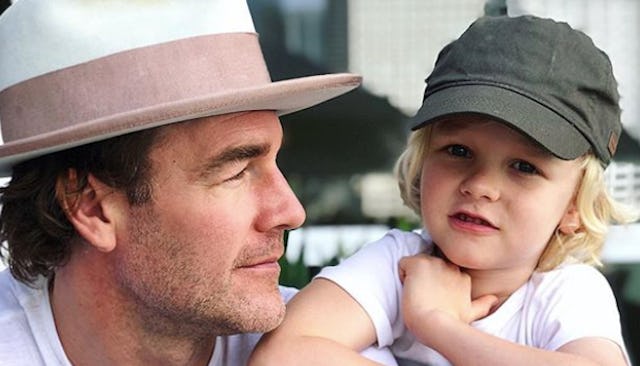James Van Der Beek's Definition Of What It Means To 'Be A Man' Is Fantastic

You won’t hear James Van Der Beek telling his son to “be a man” and “suck it up”
James Van Der Beek is the proud father of five adorable children, which means he’s not exactly a novice parent. To that end, he dishes out the occasional parenting philosophy, like he did in a recent Instagram post about toxic masculinity and how he feels about the phrase “be a man.”
“One of the most cringeworthy phrases I hear, little dude… is, ‘Be a man,'” Van Der Beek writes. “Especially when it’s said to young boys, because the message is often: ‘Be tough. Don’t cry. Suck it up. Act like nothing affects you.’ To me… that’s just empty posturing.”
Ah yes, toxic masculinity. One of the ways our society and many cultures perpetuate toxic masculinity is by teaching young boys that experiencing emotions is gender-exclusive and that boys shouldn’t cry or grow emotional.
It is, quite frankly, utter BS. Not to mention psychologically damaging. When it comes to being “a man,” why shouldn’t that include being sad? Or empathetic? Or sensitive to the feelings of oneself and others?
Van Der Beek is absolutely correct when he says it’s empty posturing. “Being a real man means being strong enough to be empathetic,” he continues. “To be sensitive. To be caring, kind, and confident enough to appreciate and nurture your feminine side.”
How many times have we heard things like “toughen up” and “boys will be boys?” It’s ridiculous and dangerous to teach boys that emotions are weak (or restricted to girls only), or that their gender gives them an excuse to be too rough, inconsiderate, and abusive. Gillette gets it, James Van Der Beek gets it, why the heck can’t everyone else catch on?
This isn’t the first time Van Der Beek has tried to redefine how we think of certain words and phrases as parents. Last summer, he shared that he and his wife, Kimberly, suffered a miscarriage — and the loss made him grapple with the word itself.
“First off – we need a new word for it. ‘Mis-carriage,’ in an insidious way, suggests fault for the mother – as if she dropped something, or failed to ‘carry.’ From what I’ve learned, in all but the most obvious, extreme cases, it has nothing to do with anything the mother did or didn’t do,” he wrote at the time. “So let’s wipe all blame off the table before we even start.”
Yes, it’s likely many of us could get behind that — especially those of us who have experienced that specific, heartwrenching kind of loss.
We should all get behind Van Der Beek’s attitude about what it really means to be a boy — and a girl, for that matter — and how we can teach our children to be even better than our parents taught us. He says that using empathy and sensitivity as a foundation for our little ones is a perfect place to start.
“If you start with that as a base, all that other stereotypically “manly” behavior (none of which is exclusive to males, btw) might just accomplish some good. But in the meantime… it’s okay to be a boy.”